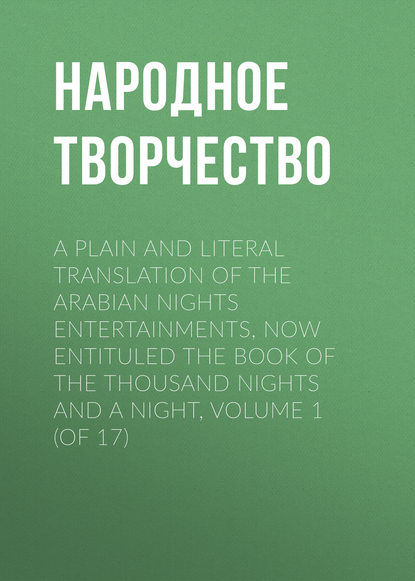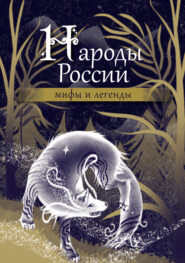По всем вопросам обращайтесь на: info@litportal.ru
(©) 2003-2024.
✖
A plain and literal translation of the Arabian nights entertainments, now entituled The Book of the Thousand Nights and a Night, Volume 1 (of 17)
Настройки чтения
Размер шрифта
Высота строк
Поля
436
Torrens, being an Irishman, translates "and woke in the morning sleeping at Damascus."
437
Arab. "Labbayka," the cry technically called "Talbiyah" and used by those entering Meccah (Pilgrimage iii. 125-232). I shall also translate it by "Adsum." The full cry is: —
Here am I, O Allah, here am I!
No partner hast Thou, here am I:
Verily the praise and the grace and the kingdom are thine:
No partner hast Thou: here am I!
A single Talbiyah is a "Shart" or positive condition: and its repetition is a Sunnat or Custom of the Prophet. See Night xci.
438
The staple abuse of the vulgar is cursing parents and relatives, especially feminine, with specific allusions to their "shame." And when dames of high degree are angry, Nature, in the East as in the West, sometimes speaks out clearly enough, despite Mistress Chapone and all artificial restrictions.
439
A great beauty in Arabia and the reverse in Denmark, Germany and Slav-land, where it is a sign of being a were-wolf or a vampire. In Greece also it denotes a "Brukolak" or vampire.
440
This is not physiologically true: a bride rarely conceives the first night, and certainly would not know that she had conceived. Moreover the number of courses furnished by the bridegroom would be against conception. It is popularly said that a young couple often undoes in the morning what it has done during the night.
441
Torrens (Notes, xxiv.) quotes "Fleisher" upon the word "Ghamghama" (Diss. Crit. de Glossis Habichtionis), which he compares with "Dumduma" and "Humbuma" determining them to be onomatopoeics, "an incomplete and an obscure murmur of a sentence as it were lingering between the teeth and lips and therefore difficult to be understood." Of this family is "Taghúm"; not used in modern days. In my Pilgrimage (i. 313) I have noticed another, "Khyas, Khyas!" occurring in a Hizb al-Bahr (Spell of the Sea). Herklots gives a host of them; and their sole characteristics are harshness and strangeness of sound, uniting consonants which are not joined in Arabic. The old Egyptians and Chaldeans had many such words composed at will for theurgic operations.
442
This may mean either "it is of Mosul fashion" or, it is of muslin.
443
To the English reader these lines would appear the reverse of apposite; but Orientals have their own ways of application, and all allusions to Badawi partings are effective and affecting. The civilised poets of Arab cities throw the charm of the Desert over their verse by images borrowed from its scenery, the dromedary, the mirage and the well, as naturally as certain of our bards who hated the country, babbled of purling rills, etc. Thoroughly to feel Arabic poetry one must know the Desert (Pilgrimage iii., 63).
444
In those days the Arabs and the Portuguese recorded everything which struck them, as the Chinese and Japanese do in our times. And yet we complain of the amount of our modern writing!
445
This is mentioned because it is the act preliminary to naming the babe.
446
Arab. "Kahramánát" from Kahramán, an old Persian hero who conversed with the Simurgh-Griffon. Usually the word is applied to women-at-arms who defend the Harem, like the Urdu-begani of India, whose services were lately offered to England (1885), or the "Amazons" of Dahome.
447
Meaning he grew as fast in one day as other children in a month.
448
Arab. Al-Aríf; the tutor, the assistant-master.
449
Arab. "Ibn harám," a common term of abuse; and not a factual reflection on the parent. I have heard a mother apply the term to her own son.
450
Arab. "Khanjar" from the Persian, a syn. with the Arab. "Jambiyah." It is noticed in my Pilgrimage iii., pp. 72, 75. To "silver the dagger," means to become a rich man. From "Khanjar," not from its fringed loop or strap, I derive our silly word "hanger." Dr. Steingass would connect it with Germ. Fänger, e. g., Hirschfänger.
451
Again we have "Dastur" for "Izn."
452
Arab. "Iklím"; the seven climates of Ptolemy.
453
Arab. "Al-Ghadir," lit. a place where water sinks, a lowland: here the drainage-lakes east of Damascus into which the Baradah (Abana?) discharges. The higher eastern plain is "Al-Ghutah" before noticed.
454
The "Plain of Pebbles" still so termed at Damascus; an open space west of the city.
455
Every Guide-book, even the Reverend Porter's "Murray," gives a long account of this Christian Church 'verted to a Mosque.
456
Arab. "Nabút"; Pilgrimage i. 336.
457
The Bres. Edit. says, "would have knocked him into Al-Yaman" (Southern Arabia) something like our slang phrase "into the middle of next week."
458
Arab. "Khádim": lit. a servant, politely applied (like Aghá=master) to a castrato. These gentry wax furious if baldly called "Tawáshi"=Eunuch. A mauvais plaisant in Egypt used to call me The Agha because a friend had placed his wife under my charge.
459
Torrens, being an Irishman, translates "and woke in the morning sleeping at Damascus."
437
Arab. "Labbayka," the cry technically called "Talbiyah" and used by those entering Meccah (Pilgrimage iii. 125-232). I shall also translate it by "Adsum." The full cry is: —
Here am I, O Allah, here am I!
No partner hast Thou, here am I:
Verily the praise and the grace and the kingdom are thine:
No partner hast Thou: here am I!
A single Talbiyah is a "Shart" or positive condition: and its repetition is a Sunnat or Custom of the Prophet. See Night xci.
438
The staple abuse of the vulgar is cursing parents and relatives, especially feminine, with specific allusions to their "shame." And when dames of high degree are angry, Nature, in the East as in the West, sometimes speaks out clearly enough, despite Mistress Chapone and all artificial restrictions.
439
A great beauty in Arabia and the reverse in Denmark, Germany and Slav-land, where it is a sign of being a were-wolf or a vampire. In Greece also it denotes a "Brukolak" or vampire.
440
This is not physiologically true: a bride rarely conceives the first night, and certainly would not know that she had conceived. Moreover the number of courses furnished by the bridegroom would be against conception. It is popularly said that a young couple often undoes in the morning what it has done during the night.
441
Torrens (Notes, xxiv.) quotes "Fleisher" upon the word "Ghamghama" (Diss. Crit. de Glossis Habichtionis), which he compares with "Dumduma" and "Humbuma" determining them to be onomatopoeics, "an incomplete and an obscure murmur of a sentence as it were lingering between the teeth and lips and therefore difficult to be understood." Of this family is "Taghúm"; not used in modern days. In my Pilgrimage (i. 313) I have noticed another, "Khyas, Khyas!" occurring in a Hizb al-Bahr (Spell of the Sea). Herklots gives a host of them; and their sole characteristics are harshness and strangeness of sound, uniting consonants which are not joined in Arabic. The old Egyptians and Chaldeans had many such words composed at will for theurgic operations.
442
This may mean either "it is of Mosul fashion" or, it is of muslin.
443
To the English reader these lines would appear the reverse of apposite; but Orientals have their own ways of application, and all allusions to Badawi partings are effective and affecting. The civilised poets of Arab cities throw the charm of the Desert over their verse by images borrowed from its scenery, the dromedary, the mirage and the well, as naturally as certain of our bards who hated the country, babbled of purling rills, etc. Thoroughly to feel Arabic poetry one must know the Desert (Pilgrimage iii., 63).
444
In those days the Arabs and the Portuguese recorded everything which struck them, as the Chinese and Japanese do in our times. And yet we complain of the amount of our modern writing!
445
This is mentioned because it is the act preliminary to naming the babe.
446
Arab. "Kahramánát" from Kahramán, an old Persian hero who conversed with the Simurgh-Griffon. Usually the word is applied to women-at-arms who defend the Harem, like the Urdu-begani of India, whose services were lately offered to England (1885), or the "Amazons" of Dahome.
447
Meaning he grew as fast in one day as other children in a month.
448
Arab. Al-Aríf; the tutor, the assistant-master.
449
Arab. "Ibn harám," a common term of abuse; and not a factual reflection on the parent. I have heard a mother apply the term to her own son.
450
Arab. "Khanjar" from the Persian, a syn. with the Arab. "Jambiyah." It is noticed in my Pilgrimage iii., pp. 72, 75. To "silver the dagger," means to become a rich man. From "Khanjar," not from its fringed loop or strap, I derive our silly word "hanger." Dr. Steingass would connect it with Germ. Fänger, e. g., Hirschfänger.
451
Again we have "Dastur" for "Izn."
452
Arab. "Iklím"; the seven climates of Ptolemy.
453
Arab. "Al-Ghadir," lit. a place where water sinks, a lowland: here the drainage-lakes east of Damascus into which the Baradah (Abana?) discharges. The higher eastern plain is "Al-Ghutah" before noticed.
454
The "Plain of Pebbles" still so termed at Damascus; an open space west of the city.
455
Every Guide-book, even the Reverend Porter's "Murray," gives a long account of this Christian Church 'verted to a Mosque.
456
Arab. "Nabút"; Pilgrimage i. 336.
457
The Bres. Edit. says, "would have knocked him into Al-Yaman" (Southern Arabia) something like our slang phrase "into the middle of next week."
458
Arab. "Khádim": lit. a servant, politely applied (like Aghá=master) to a castrato. These gentry wax furious if baldly called "Tawáshi"=Eunuch. A mauvais plaisant in Egypt used to call me The Agha because a friend had placed his wife under my charge.
459

















